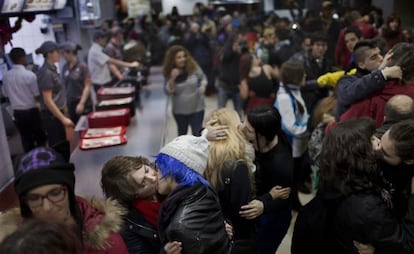Expulsion of gay couple from Burger King prompts mass kissing protest
The two young men were ejected from the Madrid restaurant by a security guard

“It was around 9.30pm, 10pm.” Jaime (an assumed name) can’t remember the exact time. But what he hasn’t forgotten, what he doesn’t think he’ll be able to forget, were the words of the security guard in the Burger King in Plaza de los Cubos, in downtown Madrid, where he was having dinner with his boyfriend on November 29. “He said to us that we couldn’t do things like that. That there were children around.” And then he asked them to leave.
The security guard was referring to the fact that the couple, aged 18 and 19, were kissing, something that prompted complaints from two families because it presented a “bad example” for their children. “We couldn’t believe it,” Jaime explains. He had never suffered such discrimination and didn’t know how to react. A married couple sat behind them tried to defend the two men. “They told us not to move, that we had every right to be there,” the youngster explains. The families who had complained squared up to the defenders. “They said that their children didn’t have to see that.” In the end, the two young men left. They didn’t want any trouble.
Two families complained about the kissing, saying it was a “bad example” for their children
And then the social networks got to work. A week after the incident, on Saturday night, dozens of same-sex couples entered the hamburger restaurant to hold a protest against homophobia by doing the same thing as the couple had done: kiss one another. The employees at the Burger King applauded. The American chain issued a statement on its Facebook page saying that “the security guard had acted on his own initiative,” and stated that the company has a “policy of zero tolerance toward any kind of discrimination, and, having learned of the facts, took immediate action to deal with the incident.” It did not, however, state what those measures were.
What happened in the Plaza de los Cubos was not an isolated incident. Homophobic assaults, both physical and verbal, have risen in recent years, according to collectives from the gay community, who are demanding a specific law, similar to one recently approved in Catalonia, which includes fines of up to €140,000.
Many homophobic attacks go unnoticed, as their victims prefer not to report them
Last year there were 38 assaults of this kind in Madrid, according to the regional government’s homosexual attention program. This year, that number was exceeded during the summer, according to Rubén López, the secretary of institutional relations at Arcópoli, the association of lesbians, gays, transsexuals and bisexuals (LGTB) at the Politécnica and Complutense universities in Madrid. The problem is that many attacks go unnoticed, as their victims prefer not to report them. “The majority have not come out of the closet and don’t want their families or friends to find out,” explains López, who says that “every week a case of harassment arrives at the association.” The last one to hit the headlines took place in September, when two youngsters beat up a male couple who were leaving a nightclub in the Moncloa district, shouting: “Get out of here, you faggots!”
“We need a law that encourages people to report these assaults,” says López. “Ninety percent of victims say nothing because they think it won’t do any good.” María Espinosa, the spokesperson from the United Left (IU) party on LGTB issues, believes that any law should place the focus on prevention. “The most important thing is education in schools to avoid discrimination,” she explains.
Tu suscripción se está usando en otro dispositivo
¿Quieres añadir otro usuario a tu suscripción?
Si continúas leyendo en este dispositivo, no se podrá leer en el otro.
FlechaTu suscripción se está usando en otro dispositivo y solo puedes acceder a EL PAÍS desde un dispositivo a la vez.
Si quieres compartir tu cuenta, cambia tu suscripción a la modalidad Premium, así podrás añadir otro usuario. Cada uno accederá con su propia cuenta de email, lo que os permitirá personalizar vuestra experiencia en EL PAÍS.
¿Tienes una suscripción de empresa? Accede aquí para contratar más cuentas.
En el caso de no saber quién está usando tu cuenta, te recomendamos cambiar tu contraseña aquí.
Si decides continuar compartiendo tu cuenta, este mensaje se mostrará en tu dispositivo y en el de la otra persona que está usando tu cuenta de forma indefinida, afectando a tu experiencia de lectura. Puedes consultar aquí los términos y condiciones de la suscripción digital.








































